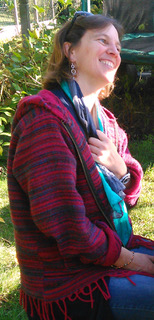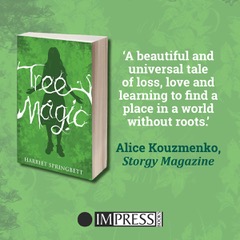Debut YA author Harriet Springbett discusses going public with your writing and why it's essential for authors to put themselves out there.

So, you want to be published? Are you sure about this – by which I mean: have you thought about why you want to be published?
I certainly didn't. Not before I’d written my novel Tree Magic, received a few rejections from leading agents, concluded it was rubbish and tossed it into a cupboard. It was only when one of the lovely ladies from my writing group asked me this question that I thought about it. And it was thanks to our discussion that I dragged Tree Magic back into the light and packed my bag for the journey ahead of me.
The word 'publish' comes from the Latin verb publicare, to make public. We tend to forget this as we toil along the lonely road towards our goal of becoming published authors. We see publication as a quality standard, a hallmark that separates writers worth reading from those who aren't good enough.
When someone asks you what you do, and you reply that you're a writer, how often do they follow up with: ‘Are you published?’
You could argue that this is just because they'd like to be able to read your work. But I'm sure the subtext to this type of question is really about the quality of your writing. What they’re actually saying is: ‘Is your writing any good?’
Of course they’re right to some extent. Having your work selected for publication means the publisher considers it worthwhile to be read by the public. But although it's rare to see poor quality writing in print, it's common to see superb writing that remains unpublished. Look at the work in any writers' group. You'd think it would win competitions, be snapped up by literary journals, fetch thousands in a publication auction. So why isn't this admirable writing in print? Simple: because there is a huge gap between creating excellent fiction and getting it accepted for publication.
Not everyone wants to bridge this gap. The act of writing is therapeutic, and you may find that releasing your feelings and letting them transform into words under your hand is enough. Before writing Tree Magic, I suffered from a long bout of baby blues, and creating stories during that period of post-natal chaos allowed me control over one part of my life. (Or was it because I was writing instead of hanging out washing that my life was so chaotic?).
Even if it’s not about therapy, you may find that the act of searching for the perfect word delights you, and you don't actually need to share the results with anyone.

Perhaps you're reluctant to invite unknown readers to form an opinion about you. Or maybe you can't face the administrative demands involved. You're right to be reticent: I hate this part. The burden of synopses, cover letters and rejections may undermine your self-confidence and crush your former innocent joy – not to mention taking time away from the act of writing.
But seeking a readership is a natural step when you've spent so long in a quest of perfection – which is why we don’t ask ourselves why we want to be published. It was years – and Tree Magic was pretty dusty – before I understood that I wanted to connect with readers in the same way a musician or a dancer communicates with their audience. This is what gave me the determination to plod on, despite my sore shoulders (the bag was pretty heavy with cover letters, a good twenty versions of the synopsis and enough elevator pitches to take me up to the top of the highest building in the world). Even so, I forgot my Latin lessons: I forgot about publicare.
Because getting published means going public. Remember this, you shy, solitary writer who prefers watching and listening to talking and giving your opinions. You will lose your anonymity. And you'll have to let go. Anyone who has children understands the popular metaphor of a book as a baby. If you sign a book contract, that baby will leave home and live its own life. Are you ready for this, or do you need to give your manuscript just one more, long hug?
Achieving your aim of being published is a wonderful feeling. Of course it is! There’s nothing like receiving a personal message from an unknown reader thanking you for writing a story that touched them so much.
But you'll need to adjust. You can empty your heavy bag, but you still need to carry it – and it will quickly fill with other things. Think about a teacher or a nurse who gets a promotion. Suddenly, they spend less time with their pupils or their patients. They have more paperwork to do. And although they’re progressing in their career, they can feel removed from their original vocation.
No longer can you sit at your desk for hours, scribbling whatever takes your fancy and daydreaming. You have to share your writing time with Twitter and Facebook, with Goodreads and your blog. You're faced with review trepidation. You must swallow your fear and say 'yes' when you're invited to talk on the radio, to make presentations to writing groups and in bookshops, to sit on a panel or lead a workshop. And then there's your next novel dancing around your mind, making faces at you, saying 'catch me if you can': and you know you must sit down and write it before it pirouettes out of reach.
Luckily, the specialists are right beside you – and this is particularly true for small publishing companies like Impress Books, whose editing and marketing team took it in turns to help me carry my bag. Publishers are experts in going public. Their hallmark is on your work, which means you're no longer alone. And they know the meaning of publicare, even if you’d forgotten it.
Harriet Springbett lives in France with her French partner and teenage daughters. Her debut novel, Tree Magic, was published by Impress Books in January 2017 and recounts how troubled teenager Rainbow, whose ability to communicate with trees makes her a misfit, struggles to find her place in the world. She is now seeking representation for her second book, a crime/YA novel. Harriet has also been shortlisted for the Bath Short Story Award this year.
Comments